This season has been a roller coaster ride.
We have fought through every single thing that has faced us. We never lost faith in each other. And we always knew that, at some point, we were going to pull it together and turn it around and be the team that we know we could be.
Before the loss to Bayern, we had won eight EuroLeague games in a row. We’ve now won 14 out of our last 16 league games. We’ve beaten some of the top teams. It shows that we have that character, we have that strength, and we have that mentality that we need.

We’ve been through a lot of things over the last three years. All of it has helped us. That momentum that we had last year kind of carried over from the year before when we lost in the EuroLeague final. Then, we won the Turkish final, and we came back last season with a mindset and energy that we were there to make our claim. To say that previous year wasn’t a fluke, that we were the best team and deserved to win the EuroLeague and the Turkish league.
Before everything stopped, we were on our way to doing that.
Then COVID hit, and the next game we played in wasn’t for another seven months or eight months. That’s a long time. None of us has ever had that kind of break. None of us has had a seven, eight-month offseason.
Mentally, it was difficult for us in the beginning of the year.
I can say without question that it was difficult for me.
LIVING WITH COVID
Everyone knows that I came into the season recovering from injury and had surgery on my knee to repair it. Over the summer, I did a lot of work to be able to come back and play. I probably needed another 2-3 weeks in order to be at my tip top shape when I joined the team, but the team was in a bad place, and I wanted to be there for them. So I came back a few weeks earlier than was ideal.
I arrived in Istanbul on October 26th, and I had only two or three practices before we played our first EuroLeague game on October 30th. I was training hard, working out two times a day, every single day, trying to get in the best shape that I could possibly be in when I joined the team. I played that first game and my body felt pretty good, and we won, and the emotions of winning felt pretty good, too.
Then I tested positive for COVID on October 31st and had to shut everything down. No weights. No running. Nothing physical for two weeks. I had to sit at home and quarantine, and I couldn’t really do anything. It set me back a month in my training. I think that was the most difficult part of the process for me.
I got lucky with the virus itself. I’m very grateful that I didn’t lose taste, didn’t lose my smell, didn’t have a bad cough. I’ve had teammates that had the virus for three weeks, and they couldn’t get rid of it. They lost their taste, lost their smell, lost like 10 pounds. So the physical aspect of the virus itself didn’t take too much of a toll on my body. My heart is with anyone who is suffering from the virus or who has lost a loved one to it. I pray that they come out of the situation healthy, and they don’t have any negative or super traumatic experiences through those times.
When I was finally able to resume training, I had to build up all the things that I had lost over that two-week span. I had to get my legs back in shape and do everything I’d been working on to get back with the team originally.
You start to question yourself. And people were certainly questioning me. I had created an expectation of myself, to be the same guy that I was last year, scoring 25 points a night, being unstoppable and doing all these things. Between the eight-month layoff, the surgery and COVID, that’s a lot lined up against me. It was difficult to try to get back to exactly who I had been the year before. I’ve been getting there little by little. It’s been better. I’ve picked it up and started to play more up to my ability and the level that I like to be at.
A lot of people have asked me what it was like going through this COVID year with OCD. It’s actually kind of ironic, because outside of wearing a mask, not much has really changed for me with COVID. Dealing with OCD for over 15 years now, I’ve been hypersensitive to these things before all this started. I’ve always washed my hands. I’ve always done all the small things that people do now due to COVID. So my day-to-day hasn’t really changed much.
Dealing with OCD in a time like this, it does kind of heighten your anxiety. I found myself, especially in the early stages of the emergence of the virus, falling back into some of my old habits, rituals and tendencies that I used to do back when I didn’t have as much control over my OCD. I started feeling the need to take more showers, washing my hands more, not touching certain things.
But it’s just another thing in life, where it’s the adversity, and you have to deal with it in any way that you can. Being strong mentally is the most important thing. Challenging myself as I did when I was younger to kind of tackle my OCD and face it head on, and control those things again has allowed me to calm my anxiety, and be more responsible through this whole process. It’s definitely helped me grow through this whole time.
DOING THE LITTLE THINGS
Now that I’ve been able to fully work myself back into shape, I feel pretty good.
Early on in the season, I was struggling. I wasn’t playing up to my level. But if you look at my play over the past few months of EuroLeague games, I don’t know exactly what my stats are, but I’m sure I’m closer to the level that I was at last year.
I feel like I’m trending in the right direction from the standpoint of not just scoring the basketball, but assists, steals and my percentages from the field. I think I’m shooting near 50 percent from the field, 50 percent from the three-point line, 90 percent from the free throw line. That last one is important to me.
Early on in my career, one of the weaker aspects of my game was being able to get to the free throw line. Coaches from college all the way to my early years in the NBA were telling me that, with my speed and my quickness, I needed to find a way to draw fouls and get to the line. While it’s true that people can’t stay in front of me, once you get by a guy, you can’t always finish over the top. Being able to use my body control to draw fouls in certain ways has helped me become a better scorer, and helped me create more pressure on the defense.
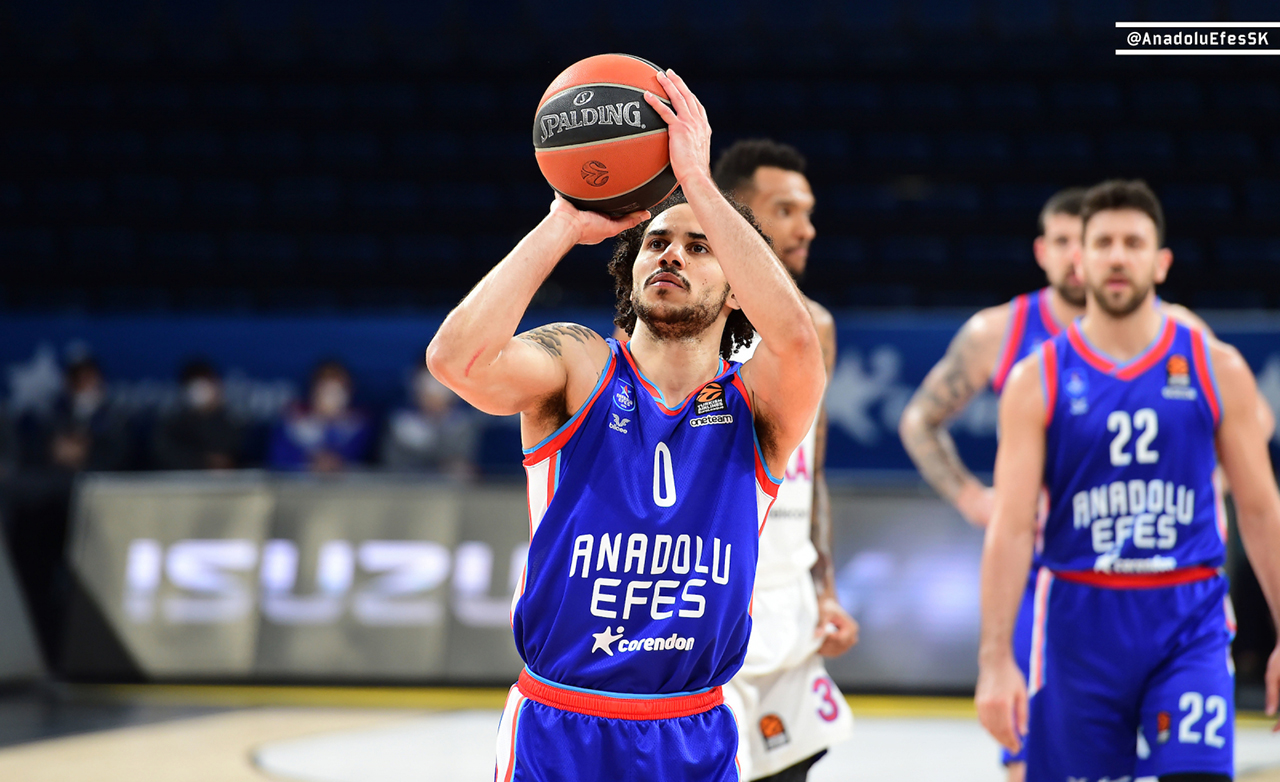
I’ve been getting a lot of four-point plays lately, and that’s a read thing. I’ve learned how to set up my defender based on who is guarding me or how they’re guarding me. I can get my shot off and focus on making the shot, while at the same time, keeping my body in certain positions that will allow me to draw the foul, too. I draw the fouls in many different ways. It’s not always the same way, the same shot, the same angle, the same situation.
So it’s just something that over the years of growing, and learning, I’m becoming a more experienced player. There’s certain ways that can help you draw fouls and get to the line and kind of help you get going. It’s an experience thing, as well as being a student of the game, and reading, as opposed to just being out there playing.
Regardless of what my offensive game is doing, I also know I can help my team win on the defensive end of the floor. I take pride on that side of the floor. So that’s my thing. I’ve tried to create turnovers, jump passing lanes, put pressure on the ball, just using my quickness to my advantage. To some degree, I credit that to playing football when I was younger. I was a defensive back, and I think that really helped with my anticipation at a very young age, just reading people’s eyes.
A lot of the time, when I know where a team is trying to go with the ball, I will bait them into thinking that what they want to do is open. Then with my speed, quickness and anticipation, I’ll jump the passing lane at the last second, and kind of disrupt their offense, and get a steal, get us out in transition, and get us a dunk or open three or something like that.
I’ve had huge games over the last few years scoring all those points, but there’s going to be days where you’re not playing the best offensive game. If you’re not doing anything defensively, you’re kind of just absent on the floor, and you’re hurting your team.
CREATING OPPORTUNITIES
I’m impacting the game however I can, and we have won a lot of games recently. So we’re doing something right. I feel really good about where I’m at. I believe I’ve recaptured that form or that rhythm that I had last year. I would love to hit my peak form down the stretch here, and carry that momentum all the way through to the playoffs.
One thing that’s different about this season is that there’s definitely been more attention on me. In the past, guys would rotate off me if one of my other teammates had an open look. This year, they’re staying with me and not giving me the same openings I had before. A lot of people would look at it and say, “Damn, I wish this wasn’t happening to me.” I see it as a sign of respect. Everybody knows what I’m capable of, what I’ve done in this league. I’ve broken so many records over the last two years that every time I step on the court, they have to account for me.
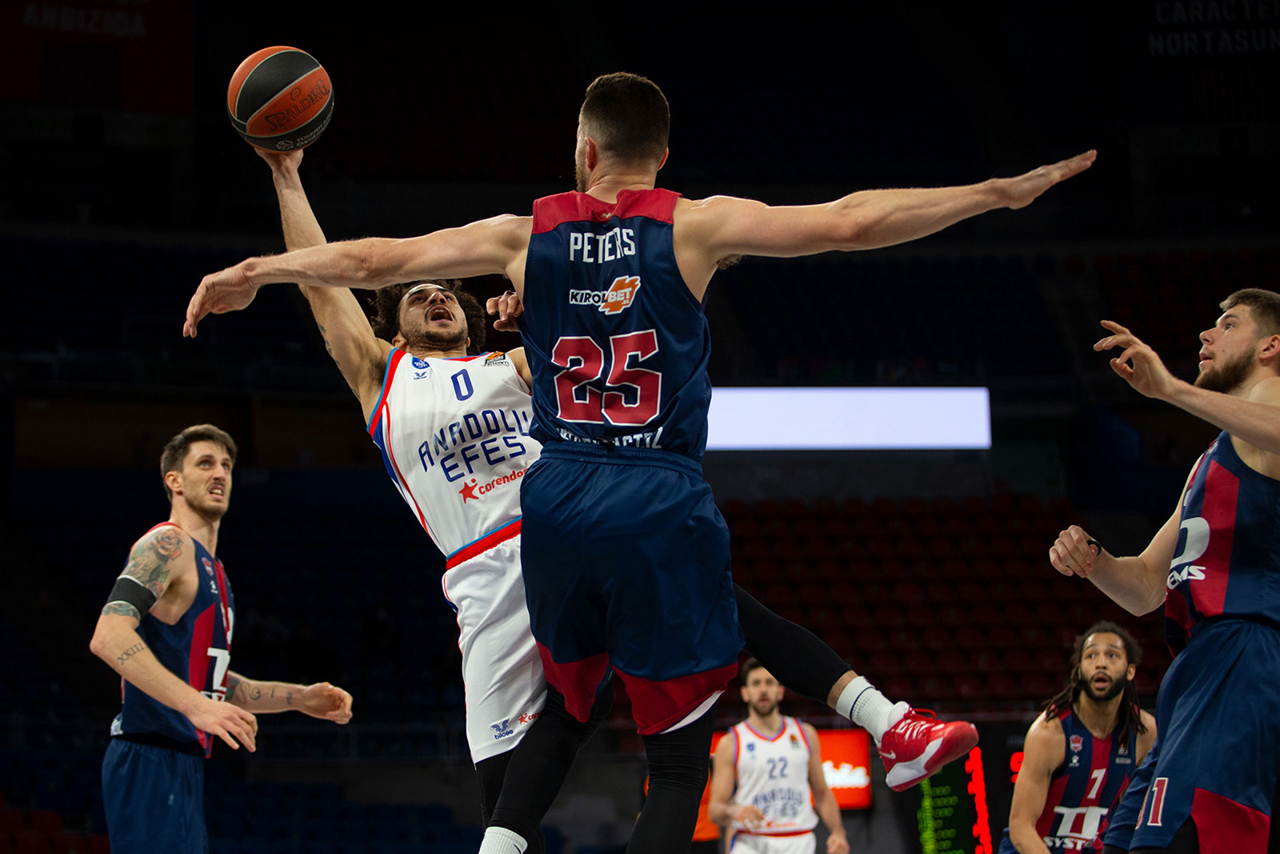
Sometimes, it’s frustrating. Everybody likes to play with freedom, to just go out there and play their game. Still, drawing that attention every single night is good in two ways. First, it’s only going to make me get better. Second, it allows some of my teammates to have the freedom they need to go out there and have big nights.
Vasilije Micic is a very important player on our team. We share the ball a lot, but I would say he’s the main point guard most of the time. So he’s extremely important, and he has all the skills and all the tools that you need to be a great basketball player.
We’ve seen him grow over the last three years to a point where he can now completely dominate a game like he did against Fenerbahçe. And with every great game that he has, he brings more of a focus on him. That opens things up for me, or for somebody else on the team to have a big game. He’s a great teammate and I like playing with him. He takes pressure off me, and I take pressure off him.
We’ve had several guys step up lately and play really well. We’ve needed to dig deep with our big men. Last year, Tibor Pleis had an unbelievable season, but this year, he has a stress fracture in his foot. Bryant Dunston has been huge over the last few years. He’s an all-time leader in blocks, a defensive forward, a strong leader. But he’s had some injuries including an eye issue this year.
So we needed another big guy to step up, and Sertaç Şanlı stepped up huge for us. Sertaç has been starting the last few weeks for us, and he’s playing great. He’s playing big. He’s probably averaging double figures, and six, seven rebounds over the last few weeks. He’s helped us get on this roll that we’re on currently.
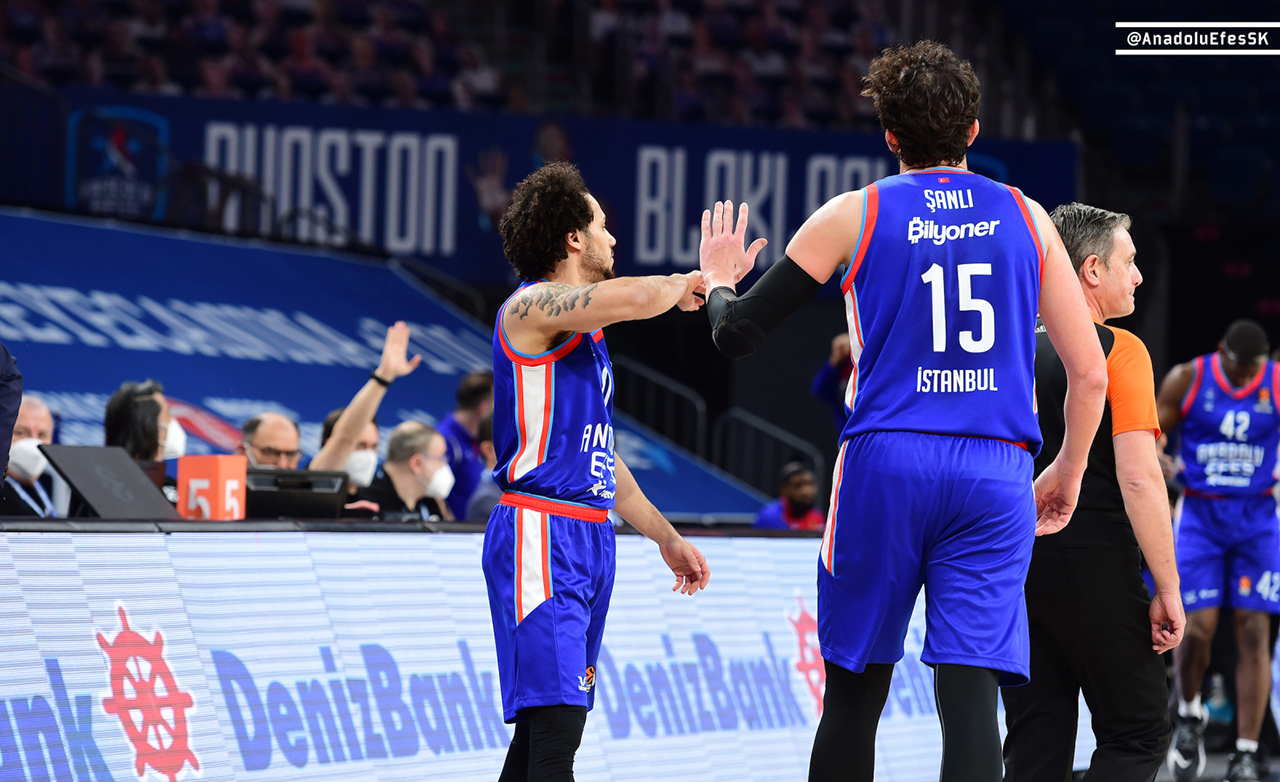
MISSING THE FANS
The missing link for all of us this season has been the lack of a fan presence.
Sinan Erdem, over the last two years, has been the most difficult place to come and play in Euroleague. With all the chanting, getting on the refs, getting on the opposing players, it’s been my favorite place to play in my career thus far.
I’m a guy that loves the game of basketball, I love the competitive side of it. But I also love the interaction with the fans. I love the energy. I feed on the energy. I love playing in front of fans. Fans are what makes the entire atmosphere feel like it’s a competition.
It’s been extremely difficult without them. I won’t lie. A lot of times, there have been points where it’s been so dead in the building that the game doesn’t feel the same. Early on especially, it was difficult mentally finding that drive and motivation and fighting to hit that next gear when there were no fans in the building.
I’ve kind of gotten used to it at this point, and I don’t really feel that much of a difference anymore. But I think that’s just because I’ve been playing now for three or four months with no fans.
Eventually, I know we’ll be able to play with a full arena again, 15-16,000 people screaming at the top of their lungs, chanting, singing songs. I’m very, very much looking forward to that day.
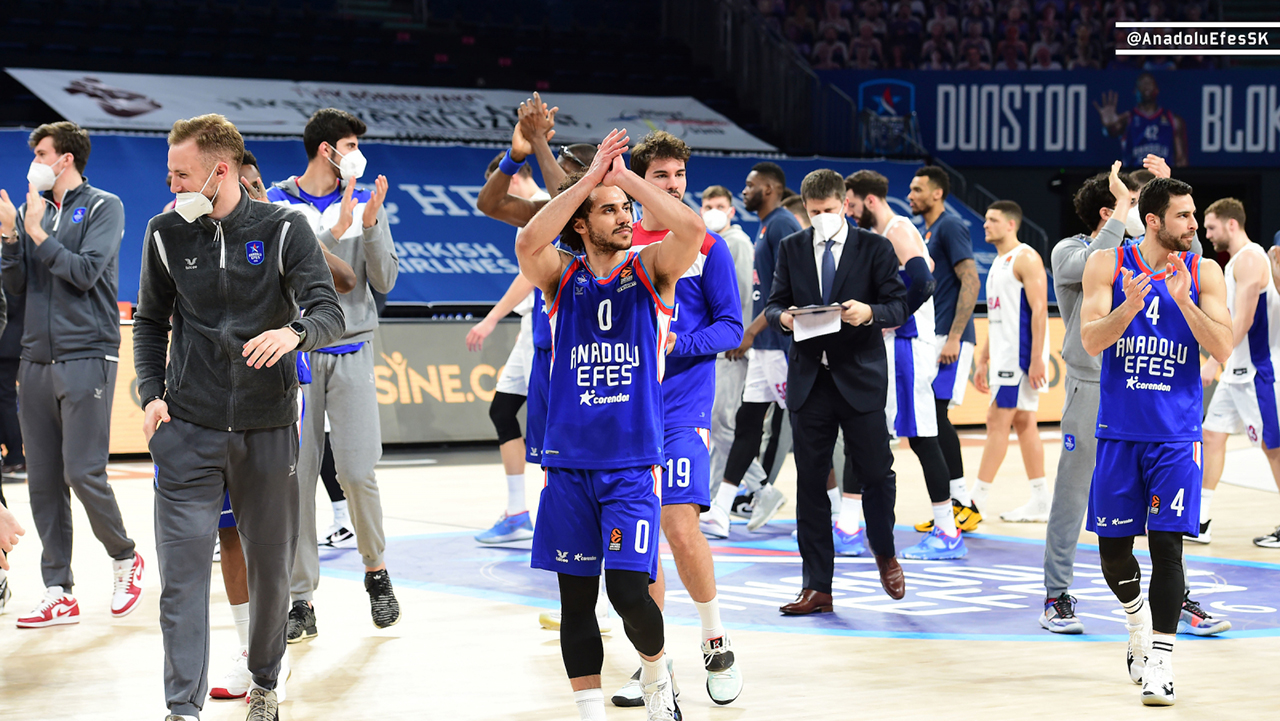
To our fans, I want to say thank you for being so patient. I started off the season not so well. I had the surgery, had COVID, had a knee issue. So everything was very fresh and very frustrating in the beginning. We started the season off struggling as a team. But you’ve stuck with us all the way through. Now we’re here and we’re playing good basketball, and we’re still not even close to playing the best that we possibly can.
But we’re hitting our stride at the right time, right before the playoffs. We still have some work to do, but we’re in good shape right now. And we’re trending in the right direction. So stay with us, stay supporting us from behind the TV, on social media, in all the ways that you can. And know that we miss you very, very much, and we love you all.
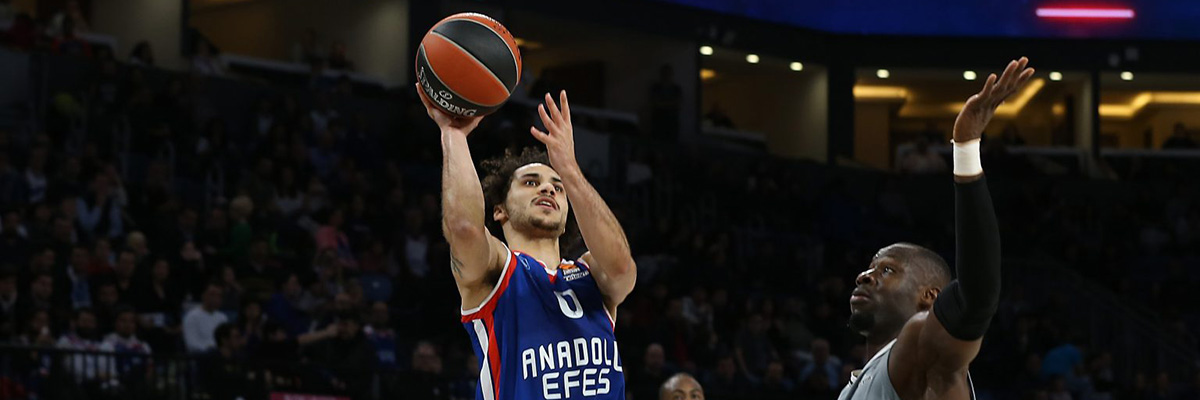
i love you so much❤️ looking forward to the day that i’ll see you
We’ll miss you too, cant wait to bring to scream in Sinan Erdem Dome
We love you LarKinG!
It is more important than anything else that you are still standing tall despite all that. Good actors always have egos, but your actions and sentences are so sincere that I feel your heart in my heart. I may have watched that great match you broke a record more than you. I get goosebumps every time. Seeing that you are so successful and resilient is very hopeful for basketball. I feel like you are one of our family. Your appearance, color, race doesn’t matter. We are all the same. Our souls are the same. I love you much. I feel very lucky to play in Turkey. I hope one day I can support our team at Sinan Erdem.
It’s so great to have this website and very good to hear from you. We count on you and the team. We love you and miss you <3
Wow. Honestly it was a great read.
We missed to be at Sinan Erdem.
Great player, teammate and character #respect
You are the King 👍🏻👍🏻
It’s good to know to learn some of the things that we have been wondering. Believe me we miss being in the arena more and can’t wait to come back I hope we can able to see and support you asap until then take care of yourself. Love u 💙
Larkin,
Seni tebrik ediyorum. Basketbolu bana ve aileme yeniden sevdirdiğin için. 1.5 yaşındaki oğluma bir Efes forması alacağım. Maçları artık onunla izleyeceğiz. Sizlerin sahadaki mücadelesi, yenseniz de yenilseniz de bizi mutlu ediyor. Pandemi döneminde en çok Efes maçlarından dolayı mutlu olduk. Oğlumu basketbola yönlendirmek istiyorum. Micic ve Sen maç esnasında yüzlerinin gülümsüyor ise biz daha mutluyuz. Bazen moralsiz gördüğümüzde karamsarız. Kendinize iyi bakın. Sizlerle biz mutluyuz. Teşekkürler.
Efes fans believe in you and the whole squad. We are the best team in Europe and I am pretty confident that we will win both Euroleague and Turkish League titles.
Man u are more than a player for us u gotta know that ❤ I hope u won’t leave us for many years and u ll keep going to be our super hero. The only thing that we can’t do is be champ and we are sure af this year that trophy will come to Istanbul in ur hands. Love u and huge respect dear Sugar Shane ❤ As u said when you were a kid, let’s dominate! 🙂
Larkin ❤ turks love you
We support you
You are the best sugar shane
First of all I’m a big fan and I respect and love you so much. You are like a hero in our house… Then, wow!… Thank you so much for such a detailed description of everything. It was such a great read for me. And as you seem a very discreet man, it’s never very easy to understand what you think or how you feel during game nights… But believe me, we are looking at your eyes to be sure if you are feeling ok… So having such a great read with your own words is very precious for us. First of all, thank you for everything… For being a part of Efes, for being a part of Turkish national team, and for putting such a great example for young Turkish players not just with your amazing talent and basketball but also with your character. You wrote that at the beginning after Covid, when you weren’t at your best form, you questioned yourself… But what you should know is that, even at the moments that maybe you questioned yourself, we never did this… We always knew who you are and we always believed in you. We know you are the brightest star that Euroleague has ever seen, and that you’ll shine even more than now in the coming days… You’ve been through a lot… And now after reading this, we see that it was more than we knew… But hopefully those days are over now… You and Efes was our only happiness and excitement during these dark Covid days. Don’t think that you are playing without fans. Believe me each house is a stadium in game days… All those screams you miss are now in every house of Efes supporters. (Ask our neighbors )Now it’s time for us to get that CUP to Turkey. But remember… For us when Efes wins it’s a great night. But when Efes wins with your show, it’s like the best night ever… And don’t forget… We love you when you play good but also when you play not so good – to the point to worry about what bothers you… So… We have a cup to win… Let’s go 🙂
Thanks for getting real and sharing man. You, as an individual and as a team have been through a lot. But I believe its only going to get better. You guys should only try and enjoy the game. A lot of people fear you and know what you are capable of. So we just gotta believe.
You are an excellent basketball player and a great person. I have been a fan of Efes for more than 30 years, I have never stopped loving the team. The current team is very special, one of the most special and you are a very beautiful part of it. Thank you for your excellent game and sincerity, my precious.
As a long time-fan of Efes (Pilsen), I must mention that our game evolved from mediocre to GOD-TIER in the past couple years and I’m safe to say that you played a big role on this. It’s a hell of a delight for me to observe you guys enjoy the game you are playing as much as we, the fans, do. I would like you to know that even though our paths get parted in the future, you will always be remembered as a LEGEND.
By the way, sharing such a genuine writing with us doesn’t only increase our sympathy towards you, but also provokes us into hearing more from you.
Take good care of yourself and stay healthy my guy.
Shane, thanks for this nice inside read. As a long time Efes fan, I have to say that you probably will be remembered as the biggest star this team ever had. But for now, I hope you will stay with us for more years and win this EL title 🙂 good luck with this season and stay healthy!
Our legend! Keep in mind before the game of Tuesday, that it’s not a big deal that you lost in Madrid! We still believe in you and in all team… You’re gonna win against RM this tuesday and then will take the trophy with your leadership! And… I pray for the glory but If anything happens and we loose… This is still ok because although you all seem to be super heroes beacuse of your invincible performances until the last 2 games; we know and understand well that you are all humans too… So we still love you so much whatever result will be and we are already very proud of all of you… Thank you for all the happiness and pride you gave us and please stay with EFES for many years to come…
Hi Shane. Your hardest times often lead to the greatest moments in your life. Keep the faith. It will all be worth it in the end. Every game starts a new page in your story. Make it a great one tuesday night. We believe you. Whatever the result you will be our hero.